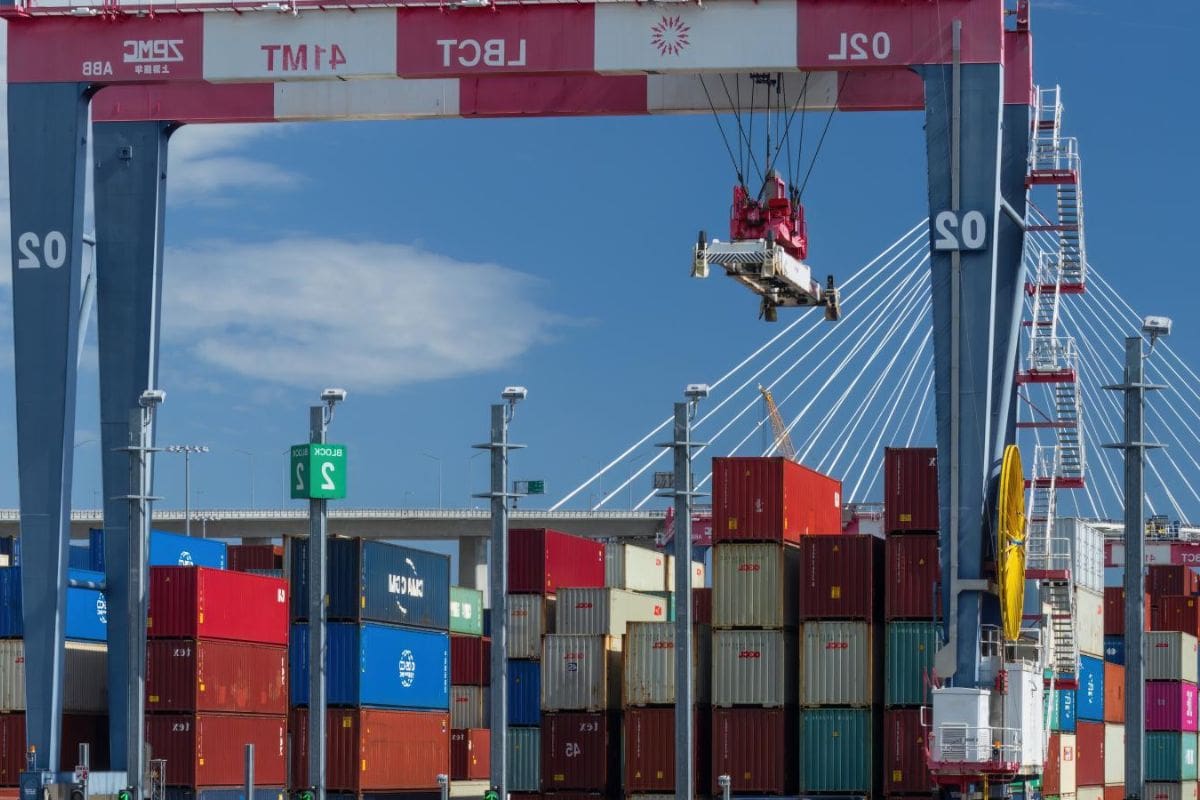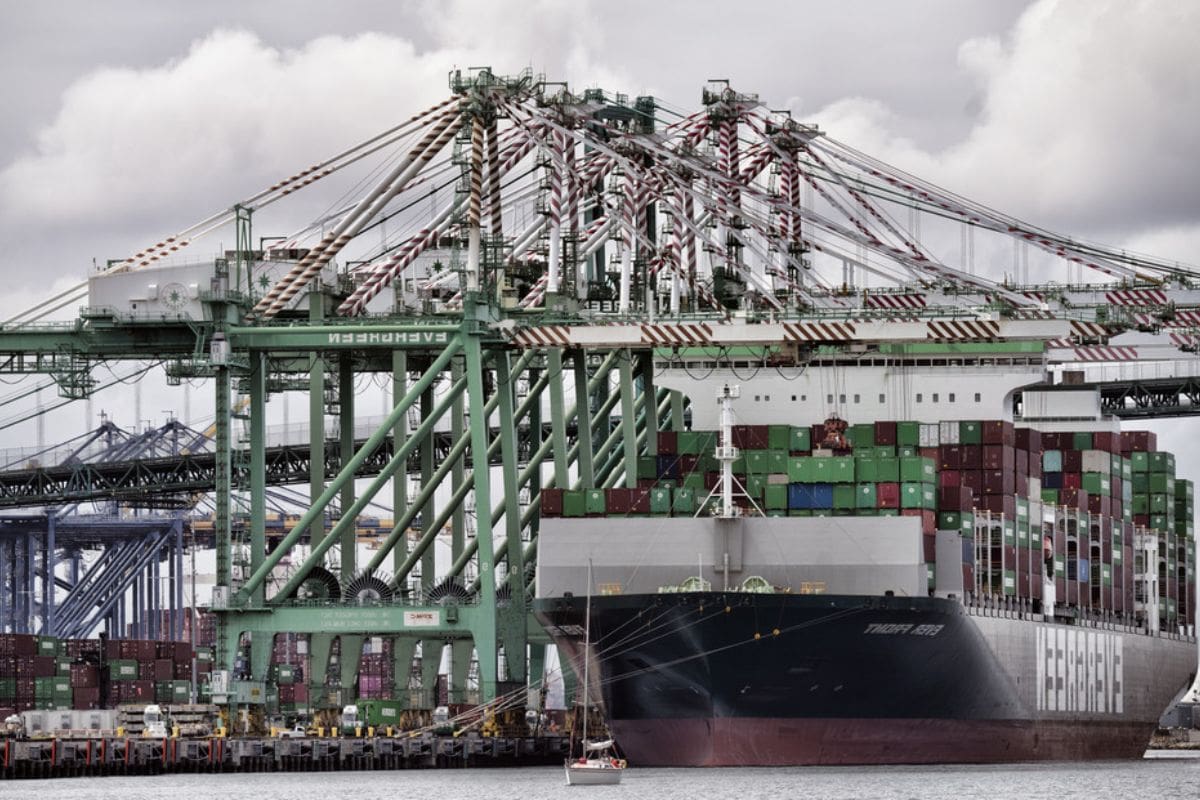California Dockworkers New Target: The clash between technology firms and labor unions in California over the issue of automation in dockwork has reached a boiling point, with dockworkers becoming the new target in the ongoing battle.
While tech firms argue that automation brings environmental benefits and increased efficiency, dockworkers fear for their jobs and the potential loss of their livelihoods.
The Teamsters union, representing the dockworkers, has raised concerns about the impact of automation on the workforce and the need for policies that strike a balance between technological advancements and job preservation. As California finds itself at a crossroads in this debate, the decisions made in this state may set a precedent for the rest of the country.
The implications of this ongoing struggle are far-reaching and warrant closer examination.
Key Takeaways
- Tech firms argue that automation can reduce greenhouse gas emissions and improve fuel efficiency, leading to cleaner air and a healthier environment.
- The ILWU and Teamsters express concerns about job losses and the potential negative impact of automation on longshore workers, dockworkers, and truck drivers.
- Policymakers face the challenge of finding a balance between technological innovation and job protection, considering the tensions between environmental goals and job preservation.
- California’s approach to balancing sustainability and job needs sets a precedent for other regions facing similar challenges, highlighting the need for a nuanced approach to technological advancements.
Tech Firms Clash with Labor Union Over Environmental Benefits
Tech firms and a powerful labor union in California are engaged in a contentious clash over the potential environmental benefits of self-driving vehicles. The state’s proposed air quality regulations, which seek to electrify ports and reduce emissions, have become a point of contention between the two sides.
On one hand, tech firms argue that self-driving vehicles can significantly reduce greenhouse gas emissions, leading to cleaner air and a healthier environment. They believe that automation can optimize routes, reduce idling time, and improve fuel efficiency.
On the other hand, the International Longshore and Warehouse Union (ILWU) expresses concerns about potential job losses due to increased automation. They fear that self-driving vehicles could render many dockworkers obsolete, leading to significant unemployment within their ranks.
This clash highlights the competing priorities of environmental sustainability and job security in the face of advancing technology.
Job Threats and Automation Fears
The potential for job losses and fears surrounding automation loom large in the debate over California’s ambitious electrification initiatives and their impact on the labor force. The International Longshore and Warehouse Union (ILWU) argues that these initiatives are a smokescreen for automation, posing a serious threat to jobs.
A report commissioned by the ILWU from the University of California, Los Angeles, highlights the risk of terminal operators embracing port automation under the guise of meeting environmental standards. This tension between environmental goals and job preservation is a significant concern. To provide a clearer picture, let’s examine the potential impact of automation on jobs:
| Job Category | Number of Jobs (2019) | Potential Impact of Automation |
|---|---|---|
| Longshore Workers | 14,220 | High |
| Dockworkers | 3,220 | High |
| Truck Drivers | 28,700 | Medium |
| Support Personnel | 9,000 | Low |
These figures demonstrate the vulnerability of longshore workers and dockworkers to automation, with a high potential for job losses. While truck drivers may also face some impact, it is considered to be of medium magnitude.
Support personnel, on the other hand, are less likely to be affected by automation. As California moves forward with its electrification initiatives, policymakers must carefully consider the potential consequences on the labor force and seek ways to mitigate job losses.
Teamsters’ Concerns
As discussions continue on California’s electrification initiatives and their potential impact on the labor force, the concerns of the Teamsters, who represent truckers moving goods from ports, come into focus.
While the Teamsters support the idea of electrification, they express worries about the rapid advancement of technology and its potential to jeopardize jobs.
Specifically, they highlight the environmental impact of autonomous vehicles’ software demands. The Teamsters emphasize the significant energy consumption required, which is equivalent to the carbon footprint of a country like Argentina.
Their concerns extend to autonomous vehicle companies like Cruise and Waymo, who aim to replace human drivers and reduce emissions. The Teamsters’ resistance reflects their commitment to protecting jobs and ensuring environmental sustainability in the face of technological advancements.

ALSO READ: Tesla Sued for Improper Handling of Hazardous Materials in California
Balancing Act for Policymakers
Finding a balance between technological innovation and job protection poses a complex challenge for policymakers navigating the transformative changes in industries like California’s dockworkers.
The tensions between environmental goals and job preservation in California are expected to have ramifications beyond the state, as other states follow suit in embracing electric and autonomous technologies.
The International Longshore and Warehouse Union’s (ILWU) stance highlights the need for a nuanced approach to technological advancements. Policymakers must address potential socio-economic impacts and ensure that the adoption of innovative technologies does not come at the expense of workers’ livelihoods.
Striking the right balance requires careful consideration of the potential benefits and drawbacks of automation, as well as the development of policies that promote both technological progress and job security.
California’s Crossroads – Setting a Precedent
California’s pivotal role in the debate over balancing environmental sustainability and job protection is setting a precedent for regions facing similar challenges in the transition to cleaner and automated transportation systems.
The outcome of the conflict in California has far-reaching implications, highlighting the delicate balance that leaders must navigate in addressing both environmental concerns and socio-economic impacts.
Technology advancements and transformative changes in industries have brought to light the complex dynamics at play. To better understand the situation, let’s take a look at the table below, which provides a snapshot of the key factors involved in California’s crossroads:
| Key Factors | Environmental Sustainability | Job Protection |
|---|---|---|
| California | Prioritizing clean systems | Ensuring employment |
| Other regions | Learning from California’s approach | Balancing sustainability and job needs |
Conclusion Of California Dockworkers New Target
The clash between tech firms and the labor union over automation in California’s dockyards highlights the ongoing concerns about job threats and the fear of increased automation.
The Teamsters’ concerns about the environmental benefits of automation add another layer to the debate.
Policymakers face a delicate balancing act in addressing these issues and setting a precedent for the future of automation in the state.

